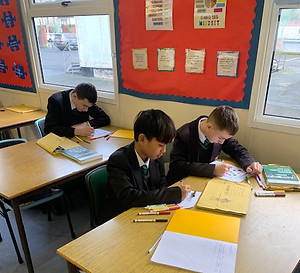business studies
business studies
business studies
FRENCH
Departmental Staff:
Ms G McMullan (Head of Department)
Miss A Rafferty
Mission Statement
“If you talk to a man in a language he understands, that goes to his head. If you talk to him in his own language, that goes to his heart." ‒ Nelson Mandela
At Holy Trinity College we believe that the ability to communicate in
another language is an important life-skill which can be applied to
future study, work, leisure and travel abroad. We encourage our
students to see the value of this, as well as to enjoy their language
learning.
The French department at Holy Trinity College aims to:
-
Provide students with the opportunity to reach their full potential in their French studies.
-
Equip students with languages as a skill for life; a skill which can be applied to future study, work, leisure or travel abroad.
-
Instil the belief and desire in students to be life-long language learners.
-
Inspire and enthuse students through their engagement in language learning.
-
Create curious, independent and resilient language learners.
-
Develop students’ communication skills, enabling them to converse confidently in a variety of contexts.
-
Develop students’ cultural awareness; fostering an open-minded attitude towards other cultures and traditions and encouraging students to embrace the fact that we live in a rich and diverse world.
-
Ensure students appreciate the value of their language studies; understanding that a working knowledge of a foreign language is a valuable asset which will broaden their horizons both socially and culturally.
-
Provide students with a deeper understanding of how language works, building a more powerful understanding of their own language.
The French curriculum at Holy Trinity College
In each French lesson students practice their reading, listening, writing and speaking skills through a wide-range of interactive activities including games, mini-whiteboard tasks and problem-solving challenges. Students use the DuoLingo app at home to both consolidate and accelerate their learning through engaging, enjoyable games. Weekly and half-termly DuoLingo leaderboards are shared with students and create a real buzz around learning French at school.
Year 8 French curriculum
The Year 8 French course provides an introduction to the French language. Students follow the Dynamo 1 course and study the following topics:
-
All about me – greetings, numbers, age, birthdays, family, personality.
-
School – colours, time, school subjects, opinions, school uniform.
-
Hobbies – weather, sports, activities, sport in Francophone countries, likes and dislikes.
-
Family life – pets, family members, where you live, meals.
-
In town – weekend plans, inviting someone out, ordering in a café, future plans.
-
Year 9 French curriculum
The Year 9 French curriculum builds on the foundation of vocabulary and grammar from Year 8. Year 9 students follow the Dynamo 2 course and study the following topics:
-
Holidays – school holidays, what you did in the holidays, where you went, how you travelled, a disaster holiday.
-
Festivals and celebrations – different festivals and celebrations, at the market, recipes, school trips, New Year celebrations.
-
Free-time – celebrities, TV programmes, digital technology, going to the cinema, leisure activities, shopping.
-
Where I live – describing where you live, helping at home, daily routine, moving house, discovering new areas.
-
Sport – different sports, opinions on sport, giving directions, injuries and illness.
Year 10 French curriculum
The Year 10 French curriculum explores some of the areas already studied in more depth and provides a string foundation for potential GCSE study. Year 10 students follow the Dynamo 3 course and study the following topics:
-
My world – likes and dislikes, after-school activities, describing your friends, birthday celebrations, clothes, weekend plans.
-
Future plans – earning pocket money, jobs, future plans, ways to earn money.
-
My life – musical tastes, what you used to be like, life in primary school, how life has changed.
-
The world – food, eating habits, the natural world, the environment, how you would like to change the world.
-
The Francophone world – where you would like to go, impressive sites and monuments, Francophone countries and people.
GCSE French curriculum
At GCSE we follow the CCEA exam specification for French. Students develop their knowledge and understanding by studying three Contexts for Learning:
-
Context for Learning 1: Identity, Lifestyle and Culture
-
Context for Learning 2: Local, National, International and Global Areas of Interest
-
Context for Learning 3: School Life, Studies and the World of Work
Students are assessed in the following skills, which are equally weighted:
-
Unit 1: Listening (25%) Foundation or Higher tier. Students listen to stimulus material in French and respond to questions.
-
Unit 2: Speaking (25%) – One teacher-conducted and externally marked speaking examination. The test includes: two role-plays and a general conversation.
-
Unit 3: Reading (25%) – Students read stimulus material in French and respond to questions. Students must also translate from French into English.
-
Unit 4: Writing (25%) – Foundation or Higher tier. Students must write shirt sentences and a piece of extended writing in French. They must also translate from English into French.

